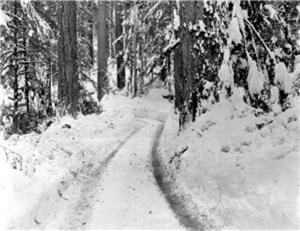This excerpted account of man-made and natural disasters at Cedar Falls (east King County) was originally recorded on June 15, 1993, as a part of the Cedar River Watershed Oral History Project. Dorothy Graybael Scott moved to Cedar Falls in 1922, as a young girl. Her father, Carl Graybael, worked for the Milwaukee Railroad in Cedar Falls, as a substation operator. Cheryl Meyer conducted the interview at Mrs. Scott's North Bend home.
Excerpts From The Interview
"There were so many tragedies up there for the size of the town. There was just always something going on.
"The City of Seattle had very poor housing up at Camp Two. Just ordinary houses. They built the dam up there, you know. I guess they didn't know as much about geology as they do now, because that's when Christmas Creek blew out and flooded Edgewick on Christmas. That's actually what formed Rattlesnake Lake -- the leakage from that dam. That would be before my time.
The Snow
"It was really a rough place to live. Weatherwise, we used to get about three feet of snow there, and my mother had come from a corner grocery situation in Seattle to where you had to order groceries on the train or from North Bend. In fact we had our milk sent up on the train. We would go down to the depot and pick it up. The cream would be frozen about so-high above the top. My brother (Wally) delivered papers up there.
"In the spring, they would have to dig out the pass by shoveling with hand shovels.
Big Fires
"When we come here in 1922, they had just had a big fire that roared down through the valley. We had outside restrooms for the two-room schoolhouse, and one of them burned up. I can't remember whether it was the boys' or the girls'. We only had one restroom, I know, when we started school. A house across the road from the school was destroyed. Thomas lived in it. They were still sifting through the ashes trying to find her diamond rings, I remember.
"Regularly, when I was a kid, about February, they'd probably put a steam engine -- a mallet -- on to help the freight train up the hill. A spark would ignite the ties or dry grass. We used to have just as bad or worse winds there than we have here in North Bend. I've seen them (the winds) pick up planks, about 10 foot long and about a foot wide and about so-thick, and throw them through our dining room window.
"Fires would get started and they'd just try to make a fire line at the end of this row of houses beyond where my folks lived. We were on the main line, and there was a row of houses behind us on the Everett line. Every year we'd have a fire! In fact, the last year they had one, it burned all Rattlesnake Mountain off, too, down both sides as far as Snoqualmie.
"One time the wind was blowing a million miles an hour and everybody started moving their valuables down to the substation. They had made room for a third set of motors, so there was a big vacant space back there. People brought their cars down and put them in there. My dad was so perturbed because he was on the shift and found out that this engineer who drove one of these electric motors had put his bird cage in behind the switchboard. He said, 'Good God!'
"But anyway, my brother and I got together keepsakes that were in a dresser drawer, bundled them up in a blanket and were holding them on with our teeth. I remember, we dropped the top of some treasured vase of Mother's and she was a little unhappy. I told her, "Mom, if you lost the house you'd appreciate what you had left!
Handling the Fires
"The last one was when I was in high school, and by that time, of course, they had better fire suppression crews. But there were no crews to come out and fight the fire. The railroad ... A house caught fire behind the schoolhouse, once, and the only way they could put it out, or keep it from spreading, was to send the steam engine down to put water on it. They used the engines for the fire protection. That's all they had. And I don't know if they had hoses? I think some of them got up on the roofs of the row of houses with garden hoses. If you let one house go, the whole row would have gone. I don't know how they really did as well as they did.
"We moved down there (to the substation) because they thought the houses were going to go. They were trying to hold it (the fire). The wind would just knock you flat! I've seen my girlfriend walk up the track, Helen Jordan. I've watched her from my window. I've seen the wind catch her and just roll her down the track, skinning her knees on ties and gravel. So they sent the steam engines up -- that was the only protection we had. They had Fire Wardens, but not any suppression crews like they have nowadays. There was nothing.
"I think we slept in the cars. I can't even remember, to tell you the truth! To tell you the truth, I don't think we did much sleeping."

